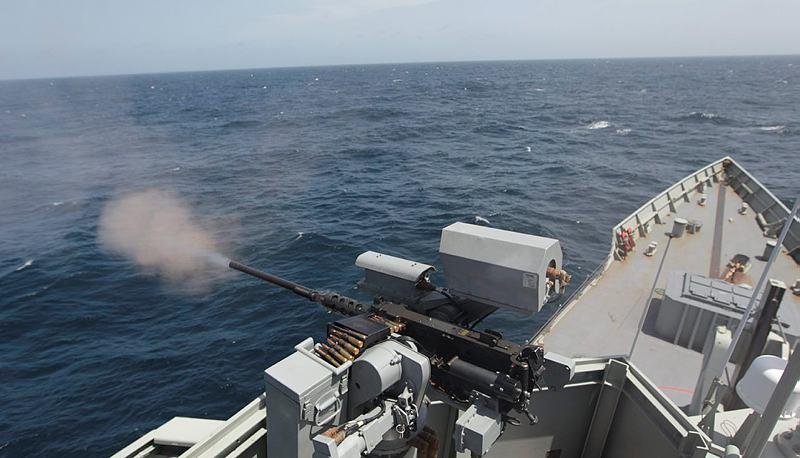Surface warships: it’s not all plain sailing
Posted By Andrew Davies and Mark Thomson on August 26, 2015 @ 06:00
Once again, Hugh White has put the cat among the pigeons; this time, by questioning the wisdom of the government’s shipbuilding plans [2]. Within days, we had responses from a retired admiral [3] and no less than the defence minister [4]. More recently, David Feeney [5] has entered the fray in defence of warships here at The Strategist.
Space prohibits us from canvassing all the arguments and counterarguments that have emerged—though it must be said that some of Hugh’s detractors make the mistake of confusing desirability with feasibility. There are many valuable tasks that warships can perform, but that doesn’t help them stay afloat. And it’s the ability of warships to stay afloat—or rather to avoid being sunk—that’s sparked the most controversy following Hugh’s intervention.
The question is all the more acute because it appears that the additional costs associated with a rolling production program [6] of surface combatants may come at the expense of submarines numbers. At the heart of the issue is the survivability of warships and submarines in future naval combat. Ultimately, the answers depend upon the future evolution of military technology above and below the surface of the sea.
Let’s start topside. The survival of warships depends on its ability to defeat incoming missiles and torpedoes. Most defensive systems will have some efficacy, but none will be 100% effective. So each weapon has some probability of striking the target. And for each hit, there will be a probability of achieving a ‘mission kill’—i.e. the ship will no longer be effective in its role—or it will be sunk.
The critical observation is that each incoming weapon succeeds or fails on a case-by-case basis, and is an ephemeral participant on the battlefield. But the ship has to defend itself against all incoming weapons if it wishes to be able to remain effective, and is therefore subject to the cumulative probability of being hit.
To see how this works, let’s be generous and say that a vessel has defences that are 90% effective on any given incoming weapon. That might be optimistic in a world of precision targeting, supersonic and multi-trajectory weapons with counter-counter measures, but let’s give the proponents of defensive systems the benefit of the doubt. Then the odds of avoiding a hit when facing multiple weapons looks like this:
| Weapons | 1 | 2 | 3 | 4 | 5 | 6 | 7 | 8 | 9 | 10 |
| Survivability | 0.90 | 0.81 | 0.73 | 0.66 | 0.59 | 0.53 | 0.48 | 0.43 | 0.39 | 0.35 |
Under that assumption the target has a 50-50 chance of avoiding a hit from six or seven incoming weapons. That mightn’t look too bad, (although we’d argue it doesn’t look great given the costs of getting that level of protection), but look what happens if the defensive system is only 80% effective:
| Weapons | 1 | 2 | 3 | 4 | 5 | 6 | 7 | 8 | 9 | 10 |
| Survivability | 0.80 | 0.64 | 0.51 | 0.41 | 0.33 | 0.26 | 0.21 | 0.17 | 0.13 | 0.11 |
Now the 50-50 level is just three weapons. So the survivability of the target is a sensitive function of its defences’ capability for even modest numbers of incoming weapons, and is always vulnerable to being overwhelmed by swarms of incoming weapons—at least one of which is likely to score a hit. And we have to remember Augustine’s 7th Law [7]: ‘the last 10% of the performance sought generates one-third of the cost and two-thirds of the problems’. Getting very high levels of defensive performance is going to drive unit acquisition and support costs up—which has seen fleet sizes fall dramatically [8] over time. The consequence is that modern navies no longer have the ability to absorb much in the way of losses.
It follows that its far better to be able to use stealth to avoid being attacked than it is to try and intercept each and every incoming weapon. In contrast to warships that cannot hide, the utility of submarines is predicated on their ability to evade detection. But how enduring a characteristic is this? Might not the oceans become transparent and submarines be rendered vulnerable?
As former physicists, our instinct is that the opacity of the ocean will remain intact for some time yet. But don’t believe us, look to what those with access to the latest in military R&D do when the stakes are at their existential highest. China, France, Great Britain, Russia and the United States all place at least part of their nuclear deterrent capability on submarines—and all have plans to continue to do so. And while there have been times in the past when surface vessels carried nuclear weapons, that was in the context of building a credible escalatory ladder during the Cold War. Nobody imagined that the tactical nuclear weapons aboard ships constituted a credible second strike capability.
Thus, when it really matters—when survivability is of paramount importance—there’s a broad consensus that submarines trump surface combatants. It follows that we share Hugh’s misgivings about the costly doubling down on surface combatants at the expense of submarines.
Article printed from The Strategist: https://aspistrategist.ru
URL to article: /surface-warships-its-not-all-plain-sailing/
URLs in this post:
[1] Image: https://aspistrategist.ru/wp-content/uploads/2015/08/20130629ran8099747_911.jpg
[2] questioning the wisdom of the government’s shipbuilding plans: http://www.theage.com.au/comment/naval-manoeuvres-a-costly-exercise-to-secure-votes-not-borders-20150816-gj0fjh
[3] retired admiral: http://navalinstitute.com.au/australian-naval-ship-building-questioned-and-defended/
[4] defence minister: http://www.minister.defence.gov.au/2015/08/20/minister-for-defence-opinion-editorial-reply-to-hugh-white-the-age/
[5] David Feeney: https://aspistrategist.ru/australias-shipbuilding-plans-are-important/
[6] additional costs associated with a rolling production program: https://aspistrategist.ru/rollin-rollin-rollin/
[7] Augustine’s 7th Law: https://aspistrategist.ru/aspi-recommends-augustines-laws-2/
[8] fleet sizes fall dramatically: https://aspistrategist.ru/graphs-of-the-week-expensive-ships-or-a-big-fleet-you-may-only-pick-one/
Click here to print.
